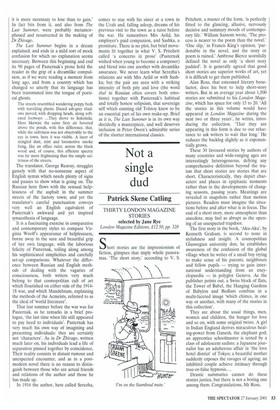Not a single dud
Patrick Skene Catling
THIRTY LONDON MAGAZINE STORIES selected by Jane Rye
London Magazine Editions, £12.50, pp. 328
Short stories are the impressionism of fiction, glimpses that imply whole panoramas. 'The short story,' according to V. S.
Pritchett, a master of the form, is perfectly fitted to the glancing, allusive, nervously decisive and summary moods of contemporary life.' William Sansom wrote, 'The process is nearer to the poem than the novel.' 'One slip,' in Francis King's opinion, 'pardonable in the novel, and the story or poem is ruined.' Ambrose Bierce scornfully defined the novel as only 'a short story padded'. It is generally agreed that good short stories are superior works of art, yet it is difficult to get them published.
Alan Ross, that esteemed literary benefactor, does his best to help short-story writers. But in an average year about 1,500 stories are submitted to his London Magazine, which has space for only 15 to 20. 'All the stories in this volume would have appeared in London Magazine during the next two or three years', he writes, introducing the collection. 'That they are appearing in this form is due to our reluctance to ask writers to wait that long.' He reduces the backlog slightly as it exponentially grows.
These 30 favoured stories by authors of many countries and wide-ranging ages are interestingly heterogeneous, defying any comprehensive definition beyond the truism that short stories are stories that are short. Characteristically, they depict characters and places in epiphanic moments rather than in the developments of changing seasons, passing years. Meanings are revealed in snapshots rather than motion pictures. Readers must imagine the situations before and after what is in focus. The end of a short story, more atmosphere than anecdote, may feel as abrupt as the opening of an unexpected trapdoor.
The first story in the book, 'Aku-Aku', by Kenneth Graham, is second to none in stylishness and insight. A cosmopolitan Glaswegian university don, he establishes awareness of the confusion of the global village when he writes of a small boy trying to make sense of his parents, neighbours and fellow pupils — trying to gain international understanding from an encyclopaedia — in polyglot Geneva. As the publisher points out, a Swiss block of flats, the Tower of Babel, the Hanging Gardens of Babylon and Bedlam combine in a multi-faceted image 'which chimes, in one way or another, with many of the stories in this collection'.
They are about the usual things, men, women and children, the hunger for love and so on, with some original twists. A girl in Indian England derives miraculous healing-power from Ganesh, the elephant god; an apprentice schoolmaster is tested by a class of adolescent sadists; a Japanese journalist has an adulterous affair in 'the love hotel district' of Tokyo; a beautiful mother suddenly exposes the ravages of ageing; an inhibited couple achieve intimacy through true-or-false hypnosis....
Drastic summaries cannot do these stories justice, but there is not a boring one among them. Congratulations, Mr Ross.






















































































 Previous page
Previous page